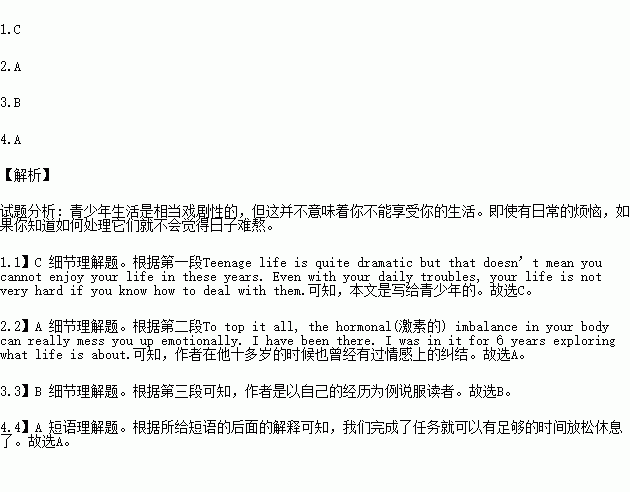题目内容
Teenage life is quite dramatic but that doesn’t mean you cannot enjoy your life in these years. Even with your daily troubles, your life is not very hard if you know how to deal with them.
I know exactly how you feel. Life as a teenager can be hard. You are not a kid anymore, because you are smart enough to observe and analyze your surroundings. However, you are still not an adult because there are still lots of experiences that you need to have and lessons that you need to learn from these experiences. To top it all, the hormonal(激素的) imbalance in your body can really mess you up emotionally. I have been there. I was in it for 6 years exploring what life is about.
As a teenager, I had a major problem with completing my chores(日常事务) on time. And at that time, all that I need to do was finish my assignments, study for the upcoming test and clean my room. Now, I have lots of things to do: cooking, cleaning and working while striking a balance between all my relationships related to work, family and friends. That really is a lot of work. So, I will just give you one golden tip, quoting from Benjamin Franklin, “Never leave that till tomorrow which you can do today.”
Life becomes much easier because I finish all my work on time and I have enough time to let my hair down. Half the problems as a teenager are because we hate doing things. We’d rather go and have fun than sit down and take care of our duties and responsibilities. That is why you have so much trouble in your life; your parents won’t let you go out with friends because you didn’t clean your room or your professor is always criticizing you because you haven’t finished your assignments.
1.Whom is the text intended for?
A. Parents B. Teachers
C. Teenagers D. Scientists
2.What do we know from Paragraph 2?
A. The author also experienced hard times in his teens.
B. The author had strong hormones in his body.
C. The author thinks teenagers have lots of experiences.
D. The hormonal imbalance has no influence on teenagers’ bodies.
3. The author tries to persuade readers mainly by means of ______.
A. quoting famous sayings by famous people
B. setting his own experiences as example
C. listing all of his troubles in his childhood
D. showing the numerous assignments for children
4.The underlined phrase “let my hair down” in Paragraph 4 means ______.
A. get relaxed B. get success
C. get out of control D. get motivated
 阅读快车系列答案
阅读快车系列答案
